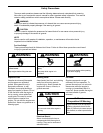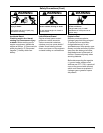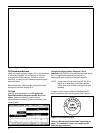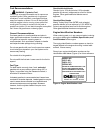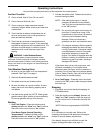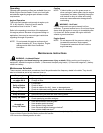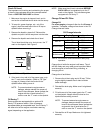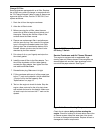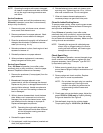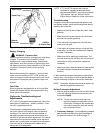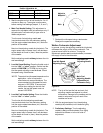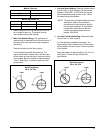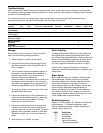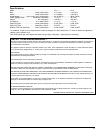
10
NOTE: Operating the engine with loose or damaged
air cleaner components could allow unfiltered
air into the engine causing premature wear
and failure.
Service Precleaner
If so equipped, wash and reoil the precleaner every
25 hours of operation (more often under extremely
dusty or dirty conditions).
1. Remove wing nuts, air cleaner cover, element
cover, seals, and element cover.
2. Remove precleaner from paper element. Wash
the precleaner in warm water with detergent.
3. Rinse the precleaner thoroughly until all traces of
detergent are eliminated. Squeeze out excess
water (do not wring). Air dry.
4. Saturate precleaner in clean, fresh engine oil and
squeeze out excess oil.
5. Reinstall precleaner over paper element.
6. When precleaner replacement is necessary
always use genuine Kohler parts.
Service Paper Element
Every 100 hours of operation (more often under
extremely dusty or dirty conditions), check the paper
element. Replace the element as necessary.
1. Remove the precleaner (if so equipped) from the
paper element.
2. Do not wash the paper element or use
pressurized air, as this will damage the element.
Replace a dirty, bent, or damaged element with a
genuine Kohler element. Handle new elements
carefully; do not use if the sealing surfaces are
bent or damaged.
3. With air cleaner disassembled, check the base
plate. Make sure it is secured and not bent or
damaged. Also check the element cover, seals,
and breather tube for damage or improper fit.
Replace all damaged components.
NOTE: Operating the engine with damaged or
loose components could allow unfiltered
air into the engine causing premature
wear and failure.
4. Reinstall the paper element.
5. If so equipped, install the precleaner (washed and
oiled) over paper element.
6. Reinstall element cover, seals, air cleaner cover
and wing nuts. Tighten wing nuts 1/2 to 1 full turn
after nuts contacts cover. Do not overtighten.
7. When air cleaner element replacement is
necessary always use genuine Kohler parts.
Clean Air Intake/Cooling Areas
To ensure proper cooling, make sure the grass screen,
cooling fins, and other external surfaces of the engine
are kept clean at all times.
Every 50 hours of operation (more often under
extremely dusty, dirty conditions), remove the blower
housing and other cooling shrouds. Clean the cooling
fins and external surfaces as necessary. Make sure the
cooling shrouds are reinstalled.
NOTE: Operating the engine with a blocked grass
screen, dirty or plugged cooling fins, and/or
cooling shrouds removed, will cause engine
damage due to overheating.
Check Spark Plug
Every 100 hours of operation, remove the spark plugs,
check condition, and reset gaps or replace with new
plugs as necessary. Use a Champion
®
type RV15YC
(or equivalent) spark plug.
1. Before removing spark plugs, clean the area
around base of plugs to keep dirt and debris out of
the engine.
2. Remove plugs and check condition. Replace
plugs if worn or reuse is questionable.
NOTE: Do not clean the spark plug in a machine
using abrasive grit. Some grit could
remain in the spark plug and enter the
engine causing extensive wear and
damage.
3. Check gaps using a wire feeler gauge. Adjust the
gaps to 0.025 in. (0.65 mm) by carefully bending
the ground electrode. See Figure 8.
4. Reinstall spark plugs into the cylinder heads.
Torque spark plugs to 10-15 ft. lb. (14-20 N·m).



